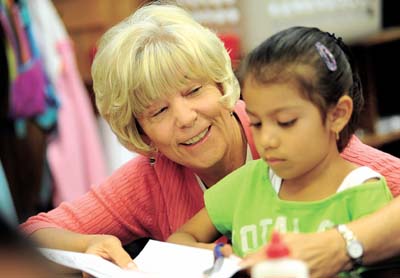
Joyce Swett, the school readiness coordinator for First 5 San
Benito, is retiring in August and she knows already what she will
miss most about the job.
Joyce Swett, the school readiness coordinator for First 5 San Benito, is retiring in August and she knows already what she will miss most about the job.
“The kids,” she said, on a recent afternoon over lunch. “The kids are just so much fun at this age. It’s so spectacular. They will tell you everything on their minds.”
In fact, she’s already lined up an opportunity to volunteer in the classroom during the coming school year. She will continue to work with the high school students who run Little Baler Preschool at San Benito High School, a Regional Occupational Program course that gives the students a taste of early childhood education.
“If I could pick one word for Joyce it would be engaging,” said Lisa Faulkner, the executive director of First 5 San Benito. “She is engaging with the kids, teachers and administrators.”
Swett has been working with First 5 since 2001 when she took a job as a teacher with the mobile preschool that visits rural San Benito County. She became the school readiness coordinator in 2004, a job that allowed her to work with many partners in the county on creating curriculum to prepare preschool students for kindergarten.
Some of the programs Swett has been instrumental in bringing to the county include “Raising a Reader,” a program that works with parents to teach them how to read aloud to children; Jump Start preschool, a five-week summer program for incoming kindergarten students that helps prepare them for the classroom; and a school garden at R.O. Hardin.
During the school year for the last five years, Swett has hosted First Thursdays, meetings for preschool and kindergarten teachers. The meeting is a chance for teachers to see if they are on the same page with curriculum and also to learn new ideas for engaging students.
“Teachers get bored,” Swett said. “It becomes a rote regiment. It’s really hard to keep students excited.”
Faulkner said one of the main things Swett has been able to do for local teachers is to connect them with ways to put recent research into action. At the lunch table, Swett pantomimed a coordination activity gets kids to move their hands up and down, from right to left, that helps children when they begin to write.
Swett described how she shows teachers how to read with the children, explaining that with some of the populations in the county they can’t take for granted that the children will know all the elements in a story. For instance, she read a story about farm animals recently and the children in the classroom didn’t know what a goose was and they had never heard of pigs eating slop. They didn’t know that a hog is the same as a pig.
“Studies show that in low-income populations one of the strongest protective factors is literacy,” Faulkner said.
See the full story in the Pinnacle on Friday.








